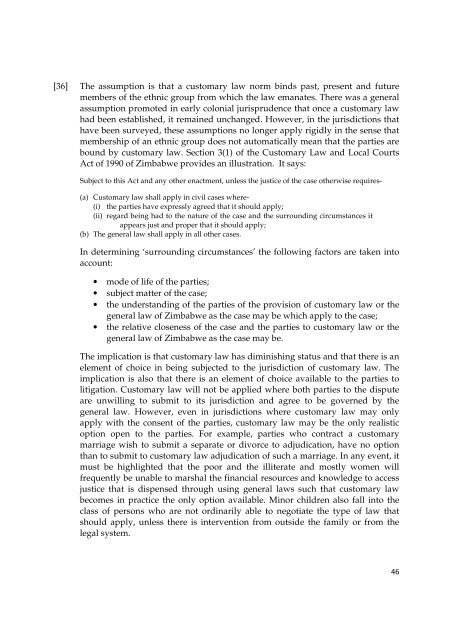sexual health and human rights in the african region - The ICHRP
sexual health and human rights in the african region - The ICHRP
sexual health and human rights in the african region - The ICHRP
You also want an ePaper? Increase the reach of your titles
YUMPU automatically turns print PDFs into web optimized ePapers that Google loves.
[36] <strong>The</strong> assumption is that a customary law norm b<strong>in</strong>ds past, present <strong>and</strong> future<br />
members of <strong>the</strong> ethnic group from which <strong>the</strong> law emanates. <strong>The</strong>re was a general<br />
assumption promoted <strong>in</strong> early colonial jurisprudence that once a customary law<br />
had been established, it rema<strong>in</strong>ed unchanged. However, <strong>in</strong> <strong>the</strong> jurisdictions that<br />
have been surveyed, <strong>the</strong>se assumptions no longer apply rigidly <strong>in</strong> <strong>the</strong> sense that<br />
membership of an ethnic group does not automatically mean that <strong>the</strong> parties are<br />
bound by customary law. Section 3(1) of <strong>the</strong> Customary Law <strong>and</strong> Local Courts<br />
Act of 1990 of Zimbabwe provides an illustration. It says:<br />
Subject to this Act <strong>and</strong> any o<strong>the</strong>r enactment, unless <strong>the</strong> justice of <strong>the</strong> case o<strong>the</strong>rwise requires-<br />
(a) Customary law shall apply <strong>in</strong> civil cases where-<br />
(i) <strong>the</strong> parties have expressly agreed that it should apply;<br />
(ii) regard be<strong>in</strong>g had to <strong>the</strong> nature of <strong>the</strong> case <strong>and</strong> <strong>the</strong> surround<strong>in</strong>g circumstances it<br />
appears just <strong>and</strong> proper that it should apply;<br />
(b) <strong>The</strong> general law shall apply <strong>in</strong> all o<strong>the</strong>r cases.<br />
In determ<strong>in</strong><strong>in</strong>g ‘surround<strong>in</strong>g circumstances’ <strong>the</strong> follow<strong>in</strong>g factors are taken <strong>in</strong>to<br />
account:<br />
• mode of life of <strong>the</strong> parties;<br />
• subject matter of <strong>the</strong> case;<br />
• <strong>the</strong> underst<strong>and</strong><strong>in</strong>g of <strong>the</strong> parties of <strong>the</strong> provision of customary law or <strong>the</strong><br />
general law of Zimbabwe as <strong>the</strong> case may be which apply to <strong>the</strong> case;<br />
• <strong>the</strong> relative closeness of <strong>the</strong> case <strong>and</strong> <strong>the</strong> parties to customary law or <strong>the</strong><br />
general law of Zimbabwe as <strong>the</strong> case may be.<br />
<strong>The</strong> implication is that customary law has dim<strong>in</strong>ish<strong>in</strong>g status <strong>and</strong> that <strong>the</strong>re is an<br />
element of choice <strong>in</strong> be<strong>in</strong>g subjected to <strong>the</strong> jurisdiction of customary law. <strong>The</strong><br />
implication is also that <strong>the</strong>re is an element of choice available to <strong>the</strong> parties to<br />
litigation. Customary law will not be applied where both parties to <strong>the</strong> dispute<br />
are unwill<strong>in</strong>g to submit to its jurisdiction <strong>and</strong> agree to be governed by <strong>the</strong><br />
general law. However, even <strong>in</strong> jurisdictions where customary law may only<br />
apply with <strong>the</strong> consent of <strong>the</strong> parties, customary law may be <strong>the</strong> only realistic<br />
option open to <strong>the</strong> parties. For example, parties who contract a customary<br />
marriage wish to submit a separate or divorce to adjudication, have no option<br />
than to submit to customary law adjudication of such a marriage. In any event, it<br />
must be highlighted that <strong>the</strong> poor <strong>and</strong> <strong>the</strong> illiterate <strong>and</strong> mostly women will<br />
frequently be unable to marshal <strong>the</strong> f<strong>in</strong>ancial resources <strong>and</strong> knowledge to access<br />
justice that is dispensed through us<strong>in</strong>g general laws such that customary law<br />
becomes <strong>in</strong> practice <strong>the</strong> only option available. M<strong>in</strong>or children also fall <strong>in</strong>to <strong>the</strong><br />
class of persons who are not ord<strong>in</strong>arily able to negotiate <strong>the</strong> type of law that<br />
should apply, unless <strong>the</strong>re is <strong>in</strong>tervention from outside <strong>the</strong> family or from <strong>the</strong><br />
legal system.<br />
46
















